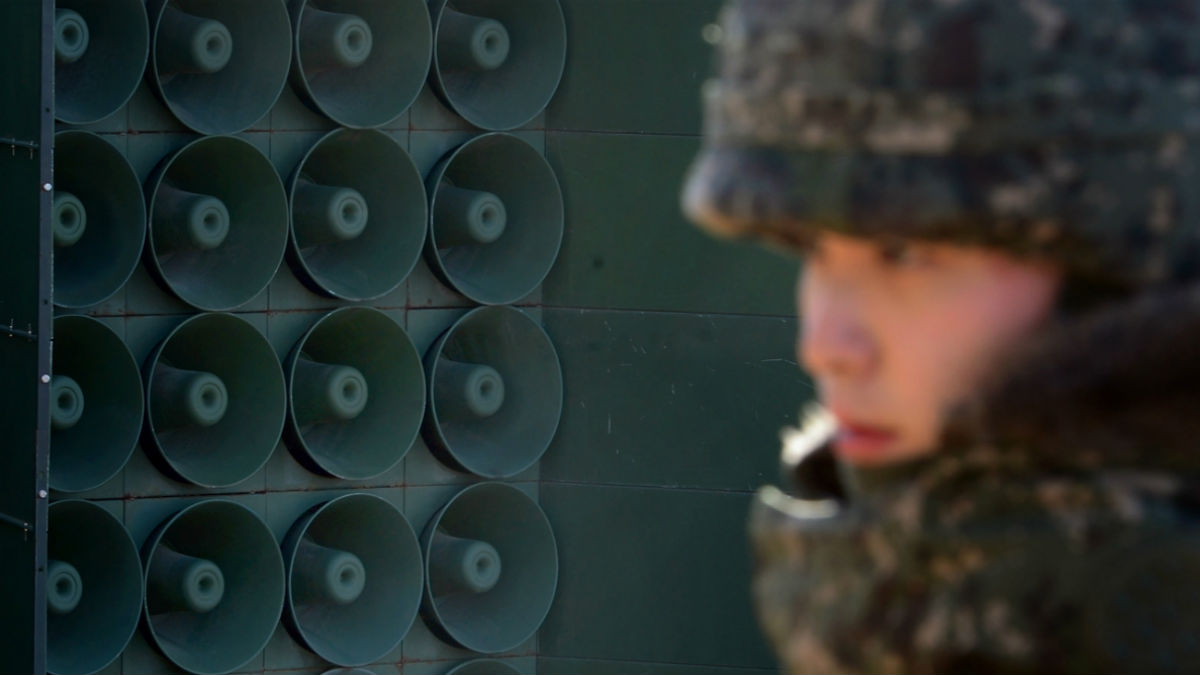South Korea's propaganda broadcasts: how do they work?
Tactics range from weather forecasts to pop songs in the bid to win over soldiers

A free daily email with the biggest news stories of the day – and the best features from TheWeek.com
You are now subscribed
Your newsletter sign-up was successful
As the world mulls its response to North Korea's claims to have tested a hydrogen bomb, South Korea has stepped into action by resuming its propaganda broadcasts across the border. It may seem like a relatively restrained reaction to what the South's President Park Geun-hye called the "grave provocation" of the North, but the broadcasts have been a key bone of contention between the two Koreas.
How do the broadcasts work?
Propaganda programmes are blasted across the border using loudspeakers, targeting North Korean troops stationed in the Korean Demilitarised Zone (DMZ). While it is impossible to clearly measure its effects, the reaction of the North Korean regime suggests it fears their impact. In the past, North Korea has threatened to use force to silence the speakers and frequently blasts out its own propaganda in an attempt to drown out the broadcasts, The Guardian reports.
The Week
Escape your echo chamber. Get the facts behind the news, plus analysis from multiple perspectives.

Sign up for The Week's Free Newsletters
From our morning news briefing to a weekly Good News Newsletter, get the best of The Week delivered directly to your inbox.
From our morning news briefing to a weekly Good News Newsletter, get the best of The Week delivered directly to your inbox.
When did they start?
Radio has been used as a tool of psychological warfare since the Korean War in the 1950s, but in the 1990s, the South developed a more subtle approach. Taking a conversational tone, the broadcasts try to win over North Korean listeners with appealing portraits of life in the South and the benefits of reunification.
The South agreed to cease transmissions in 2004, but renewed them six years later, when relations deteriorated. Last year, they stopped them once again in an attempt to defuse mounting tensions after an incident in which two South Korean soldiers were injured by a landmine while on border patrol.
What do they say?
A free daily email with the biggest news stories of the day – and the best features from TheWeek.com
Main programme The Voice of Freedom sings the praises of democracy and life in the outside world as well as reporting news censored by Pyongyang's state media. Defectors from the North frequently speak on the air to report their experiences of freedom.
Aware that they are dealing with people raised in isolation from the outside world, broadcasters use a variety of tactics to win the trust of North Korean soldiers. One popular method is to put out accurate weather forecasts – something the technologically lacking North cannot do – to convince the soldiers that South Korea's information can be believed, the Korea Times reports.
Surprisingly, the most popular element of the broadcasts doesn't appear to be news from the outside world, but pop songs. The bubblegum sounds of South Korea's K-pop are an underground sensation in the North, defectors report, and are smuggled into the country on memory sticks and hard drives.
-
 At least 8 dead in California’s deadliest avalanche
At least 8 dead in California’s deadliest avalancheSpeed Read The avalanche near Lake Tahoe was the deadliest in modern California history and the worst in the US since 1981
-
 Political cartoons for February 19
Political cartoons for February 19Cartoons Thursday’s political cartoons include a suspicious package, a piece of the cake, and more
-
 The Gallivant: style and charm steps from Camber Sands
The Gallivant: style and charm steps from Camber SandsThe Week Recommends Nestled behind the dunes, this luxury hotel is a great place to hunker down and get cosy
-
 US, Russia restart military dialogue as treaty ends
US, Russia restart military dialogue as treaty endsSpeed Read New START was the last remaining nuclear arms treaty between the countries
-
 What happens now that the US-Russia nuclear treaty is expiring?
What happens now that the US-Russia nuclear treaty is expiring?TODAY’S BIG QUESTION Weapons experts worry that the end of the New START treaty marks the beginning of a 21st-century atomic arms race
-
 Epstein files topple law CEO, roil UK government
Epstein files topple law CEO, roil UK governmentSpeed Read Peter Mandelson, Britain’s former ambassador to the US, is caught up in the scandal
-
 Iran and US prepare to meet after skirmishes
Iran and US prepare to meet after skirmishesSpeed Read The incident comes amid heightened tensions in the Middle East
-
 Israel retrieves final hostage’s body from Gaza
Israel retrieves final hostage’s body from GazaSpeed Read The 24-year-old police officer was killed during the initial Hamas attack
-
 China’s Xi targets top general in growing purge
China’s Xi targets top general in growing purgeSpeed Read Zhang Youxia is being investigated over ‘grave violations’ of the law
-
 Panama and Canada are negotiating over a crucial copper mine
Panama and Canada are negotiating over a crucial copper mineIn the Spotlight Panama is set to make a final decision on the mine this summer
-
 Why Greenland’s natural resources are nearly impossible to mine
Why Greenland’s natural resources are nearly impossible to mineThe Explainer The country’s natural landscape makes the task extremely difficult